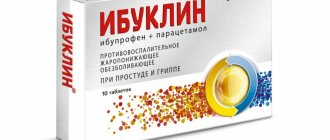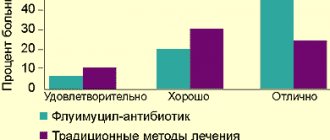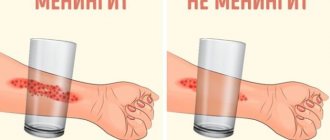An increase in body temperature is a symptom that expresses the body's response to an inflammatory process, the invasion of an infectious agent or toxin. You should take an antipyretic if the thermometer shows more than 38.5°C. For chronic diseases and poor health, intake is also indicated at a lower value.
Pharmacy chains offer a wide range of medications for fever. We will look at which of them are most effective for adults and children in the article.
Types of medications for fever
There are four groups of antipyretics:
- With paracetamol as an active ingredient. The substance belongs to non-narcotic painkillers. It affects the production of prostaglandins, therefore it can reduce fever and pain. It does not have a damaging effect on the gastrointestinal mucosa and has a weak anti-inflammatory effect. A safe dose for adults is 4 g per day.
- With ibuprofen, which has a triple effect - relieves pain, relieves fever, fights inflammation. The effect lasts for 8 hours, after administration the effect begins within 30 minutes. It is one of the safest NSAIDs, but may have a negative effect on the gastrointestinal tract. The maximum amount for adults is 1.2 g per day.
- With acetylsalicylic acid. A less popular group, not prescribed to children under 12 years of age, can cause bleeding and erosion of the digestive organs.
- With a combined composition including paracetamol and ibuprofen. Such drugs have less toxicity and enhanced effect.
- Based on analgin. They have analgesic, anti-inflammatory and antipyretic effects. Children in the form of candles are allowed to use from 1 year. Side effects may cause allergies.
Why does the temperature rise?
An increase in temperature provokes the release of special substances into the blood - pyrogens, which are responsible for inflammatory processes. Pyrogens affect metabolic processes and stimulate one of the areas of the brain (hypothalamus), which is responsible for thermoregulation. As a result, heat production in the body increases.
In addition to fever, other unpleasant symptoms may appear - chills, headache, weakness, pain in muscles and joints. All of them are associated with metabolic and heat exchange disorders. With the help of elevated temperature, the body protects itself from viruses and bacteria that have penetrated it.
An increase in temperature of more than 38 ° C can harm the body. Blood pressure rises, proteins breakdown in various organs, which causes poisoning. The result may be fainting, upset stomach, heart failure, and kidney failure.
Release forms of antipyretics
Medicines for fever may differ not only in the active substance, but also in the form of release.
It is selected based on the patient’s age, hyperthermia tolerance, the presence of chronic pathologies, and intolerance to certain substances.
Main types:
- capsules and tablets. They have a lower price compared to other forms and are universal in use. One piece is enough to reduce the indicator for 6-8 hours. Suitable for fever in adults, but not prescribed for small children and unconscious patients;
- water-soluble tablets and powders. The action develops faster, but their price is more expensive than conventional fever tablets;
- solutions for injections and systems. Used in hospitals to provide emergency assistance to avoid seizures, to relieve fever in unconscious persons. The advantage is that the medicine immediately enters the bloodstream, there is no contact with the mucous membrane of the stomach or intestines;
- suspensions and syrups. They are produced for children, contain flavorings and dyes, and are equipped with a dosing device or measuring spoon. May cause allergies.
- suppositories for rectal administration. Prescribed to children, patients with intolerance to oral medications, and incapacitated patients. They act quickly and effectively and do not irritate the stomach.
Doctor's advice
Herbal preparations are often used to reduce temperature, for example, linden flowers, chamomile, rose hips, plantain, coltsfoot. Blackcurrant drinks help bring down the temperature.
Rosehip infusion is good for reducing fever, especially if the fever is associated with colds. It is recommended to drink this drink regularly during fever, as this remedy helps to quickly lower it and improves immunity.
Drinks with honey or lemon are also very beneficial. In addition, they contain vitamin C, which is essential for colds and flu.
It is not recommended to consume these drinks hot, as this can lead to overheating of the body. It is worth remembering that lemon can have an acid-forming effect on the stomach, so tea with lemon is not recommended for people with stomach diseases.
How to bring down the temperature?
Basic medications for fever in adults
Let's look at the top tablets for fever for adults, which in most cases are prescribed by doctors:
- Paracetamol in a dosage of 200/500 mg and its analogues - Panadol, effervescent tablets Efferalgan, Rinza with caffeine and phenylephrine. The maximum quantity for a single dose is two tablets of 500 mg. You must wait 4 hours between doses. Tablets are taken no more than four times a day;
- Ibuklin, each tablet contains 400 mg of ibuprofen and 325 mg of paracetamol. It acts 20-30 minutes after administration, the effect lasts 6-8 hours. Take one tablet three times a day;
- Nurofen and Nurofen Long. Available in tablets with a dosage of 200 mg. To enhance the effect, it is also available in combination with paracetamol. Take one tablet 3-4 times a day for 2-3 days;
- Aspirin, which comes in the form of hard and effervescent tablets. The effect becomes obvious after 15-20 minutes and lasts up to 6 hours.
- Theraflu extratab contains 650 mg of paracetamol, phenylephrine and chlorphenamine maleate, has a complex effect - antipyretic, antihistamine and vasoconstrictor.
Ways to reduce the temperature at home
There are several ways to lower your temperature at home.
- Drink plenty of fluids. It is recommended to drink more than usual - up to 2-2.5 liters per day. The main thing is that the drinks are not hot. Berry fruit drinks, compotes, juices, still mineral water, teas with lemon and raspberries are perfect.
- apply compresses. Wet a towel with cool water, wring it out, and place it on your forehead, neck, or armpits.
- Another way to reduce fever is to rub your body. How to do this? Moisten the towel with warm water (27-33 °C). The patient lies in bed, first they wipe the face, forehead, then the arms and legs.
Compote with berries
What products can pregnant women use?
The period of waiting for a child imposes restrictions on the woman’s choice of medications. Not all antipyretic pills are allowed during pregnancy, so it is necessary to coordinate the issue with a therapist or gynecologist.
In addition, it is not necessary to take medicine in all cases; sometimes a slight increase in temperature is an indicator of a change in a woman’s hormonal levels.
The safest medicine is Paracetamol without any additives and in the minimum dosage. The duration of use should be minimal - until positive dynamics appear.
The second drug is Ibuprofen, but it is strictly prohibited in the middle of pregnancy with increased uterine tone and the threat of miscarriage. In the third trimester, admission is prohibited.
Prohibited products include Ibuklin, drugs based on analgin, acetylsalicylic acid, Next.
Is it necessary to lower the temperature?
Depending on the level of increase, the temperature is divided into:
- Subfebrile (37-38 °C)
- Febrile (38-39 °C)
- High (39-40 °C)
- Excessively high (from 40 °C)
In itself, a temperature of 37-37.5 ° C is not dangerous and does not cause harmful consequences. But if such a low-grade fever persists for a long time, then there is a need for additional diagnostics.
At a temperature of 37.5-38 °C, the body actively fights infection. Consequently, by bringing down this temperature, we disrupt the functioning of protective mechanisms. As a result, this can worsen the course of the disease and lead to the development of complications.
In addition, such a temperature can occur not only with infectious diseases. In some pathologies (thyroid disease, trauma, and nervous strain), an increase in temperature is also observed.
If the body temperature is 38.5 °C or higher, then do not forget that each person reacts differently to elevated temperature. In this case, the question of whether it is possible to reduce the temperature is best asked to a doctor.
Medicines for high fever for children
For young children, medication for fever should be prescribed by a pediatrician. Children are prescribed rectal suppositories and syrups, preschoolers - syrups and suspensions, schoolchildren - antipyretic tablets in solid or effervescent form, powders for making drinks.
Main drugs:
- Tsefekon D suppositories with paracetamol are indicated for children from one month to 12 years. Available in dosages of 50, 100 or 250 mg for different ages;
- Nurofen suspension for children from three months, 5 ml contains 100 mg of ibuprofen;
- Paracetamol or Panadol in syrup, can be used in children from three months;
- Efferalgan solution based on paracetamol from 1 month;
- Nimesulide suspension or tablets when paracetamol and ibuprofen are ineffective in children over 12 years of age.
Is it time yet or not yet?
The SARS-CoV-2 virus feels at ease at temperatures up to 38°C, so a slight excess of this limit level can be regarded as a natural reaction of the body. And although the virus itself cannot be destroyed by high temperature, it will help mobilize the immune system so that it begins to produce antibodies to fight the infection.
Therefore, if the temperature is below 38.5°C, there is no need to take medications that help bring it down. Exception: if the elevated temperature is poorly tolerated by the patient, causes convulsions, tachycardia, pressure surges, severe body aches or an unbearable headache. In this case, you can take, for example, antispasmodics. But it’s better to try to cope without medications: for example, with wet wipes and plenty of warm liquid (with raspberries, lemon, cranberries), as well as frequent ventilation and humidification of the room. However, it is important to remember that in children and the elderly the critical temperature value is lower (38°C).
What is the most “threatening” symptom of coronavirus? More details
If the temperature rises above 38.9°C, then it is necessary to bring it down with medication, since it no longer has any therapeutic value. On the contrary, it poses a great threat to the body and, above all, to the cardiovascular system. With very significant heat (temperature from 41°C), the load on the heart increases 5-6 times, and if the thermometer reaches 42°C, this is already deadly, because at such values proteins begin to coagulate (and humans, as we remember , refers to the protein form of matter).
Treatment
Help before diagnosis
Most attacks of heat in the body without fever are not associated with pathological factors. To stop them, non-drug methods are sufficient. Patients need to exclude from the diet foods that are too hot and spicy, causing hot flashes. Food should be warm, but not hot. The same applies to tea, coffee and other drinks. It is necessary to limit alcohol consumption as much as possible, especially strong alcohol - with an ethanol content of more than 20%.
In order not to provoke paroxysms of heat throughout the body, you should regularly ventilate the room, avoid stuffy rooms and crowds of large numbers of people. It is important to eliminate stressful situations at home and at work as much as possible. Doctors recommend reducing the time spent surfing the Internet and watching TV shows. Frequently recurring attacks of fever without an increase in temperature are a reason to consult a doctor, as they may be a sign of serious illness.
Conservative therapy
The selection of medications for heat in the whole body without temperature is carried out after determining the cause of the ailment. If hot flashes occur against the background of menopausal syndrome, gynecologists prescribe hormone replacement therapy. Treatment helps normalize well-being, reduces the frequency of hot flashes, and eliminates other symptoms of menopause. For hypertension, rational antihypertensive therapy is prescribed, taking into account the patient’s age and the severity of the disease.
To reduce the activity of autonomic reactions, sedatives are recommended. Treatment begins with herbal remedies (St. John's wort, motherwort, valerian), and if they are ineffective, mild tranquilizers are added. To stabilize the psycho-emotional background, antidepressants are used. Neurometabolic stimulants and multivitamin complexes have a good effect.
The symptom is often provoked by emotional lability, so psychotherapy is an important component of treatment. Patients are recommended individual and family psychological correction. To normalize the state of the nervous system, physiotherapeutic techniques are used: neurosedative massage, reflexology, balneotherapy. Spa treatment is indicated.








